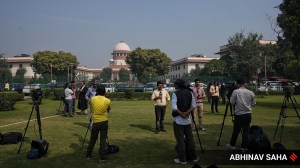- India
- International
Under Government Control
Under the UGC Act, the HRD ministry has the power to declare any institution a “deemed to be university” (DU).
 The functional autonomy of the UGC is compromised by the UGC Act.
The functional autonomy of the UGC is compromised by the UGC Act.
By M.M. Ansari
The ministry of human resource development has constituted a committee under the chairmanship of Hari Gautam for the “review of University Grants Commission for its restructuring and strengthening to address the challenges of higher education”. The government’s order shows that as many as 14 terms of reference (ToRs) have been identified for the committee. A cursory glance at them indicates that the UGC is unable to fulfil its mandate to promote, coordinate and maintain standards of university education, or to disburse funds to eligible institutions. This is probably due to the internal inefficiency of the UGC.
The ToRs, however, do not take note of external factors, particularly the legal handles through which the functioning of the UGC is tampered with by the HRD ministry. The problems that are not included in the ToRs but are responsible for the ineffective functioning of the UGC are as follows. First, the UGC is the only national commission which functions with part-time, non-executive members (10), most of whom are serving vice chancellors or college principals, funded and regulated by the UGC themselves.
The government does not feel it necessary to appoint full-time experts to guide and manage the vast education system. Nor does it see any conflict of interest in appointing serving heads of educational institutions as members. Such an organisational structure was deliberately created and is being retained by the Central government. In effect, the UGC functions as a subordinate office of the HRD ministry, toeing the Centre’s line.
Second, under the UGC Act, the HRD ministry has the power to declare any institution a “deemed to be university” (DU). In exercise of this power, as many as 130 universities, largely under private management, have been established. Sensing the preferences of successive governments, the UGC from time to time gives the “desirable” advice, whenever sought by the ministry, to create such institutions. Of late, the credibility of a few DUs has been questioned. The Tandon Committee, which scrutinised the performance of DUs at the behest of the HRD ministry, recommended the closure of at least one-third of them (44). But this has not been done, mainly because of a lack of political courage.

Education is a subject on the concurrent list. Since 2009-10, the Centre has not been entertaining proposals for establishing DUs. Most state governments have encouraged the establishment of private universities and colleges as profitable ventures to reduce their burden to support higher education.
Business houses and industrialists have established their own colleges and universities with the support of political parties in power. Over 80 per cent of universities and colleges are under private management and over 60 per cent of students study at these institutions. Public universities are hardly effectively operationalised in terms of infrastructure or staff, which is why none of them makes the top 200 in global rankings. The Centre and states should act responsibly in providing a policy framework and resources to promote quality education rather than casting aspersions on bodies like the UGC, which is heavily dependent on the ministry for legal and administrative support, for funding higher education and for hiring the services of specialists.
Third, the functional autonomy of the UGC is compromised by the UGC Act. Recently, the commission tried to rationalise decisions on a number of issues, but it was not allowed to function autonomously or in a transparent and objective manner. For instance, government directions under Section 20 of the UGC Act reversed a number of UGC decisions, or were issued without regard for efficiency in the delivery of educational services — take the rollback of Delhi University’s four-year undergraduate programme, to which the UGC had already provided tacit support.
The purpose of this discussion is to demonstrate that the relevant laws governing the management and regulation of higher education and the manner in which these are implemented by the HRD ministry should also be reviewed to improve the responsiveness of higher education institutions to the society and economy. Unfortunately, the scope and coverage of the ToRs, as submitted to the review committee, is confined to operational areas of the UGC. Certain aspects of the role of the central bureaucracy have been ignored. Is this not an attempt to find a scapegoat in the UGC for the malfunctioning of higher education systems?
The HRD has constituted different committees, the reports of which have already been submitted to the government, with a view to creating separate regulatory authorities for open and distance education, and for carrying out accreditation of institutions and amendments to the UGC Act. Yet these areas of concern have also been mentioned in the ToRs, which would lead to the duplication of efforts and waste of resources.
To conclude, in the context of today’s knowledge economy and the globalisation of education, we ought to evolve a comprehensive approach to reform higher education systems so that they are more responsive to societal aspirations. The constitution of the review committee by the government does not meet such expectations.
The writer is member, University Grants Commission
express@expressindia.com
EXPRESS OPINION
More Explained
Apr 26: Latest News
- 01
- 02
- 03
- 04
- 05











































